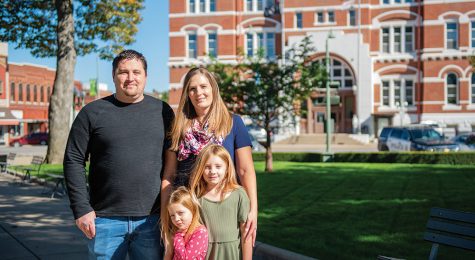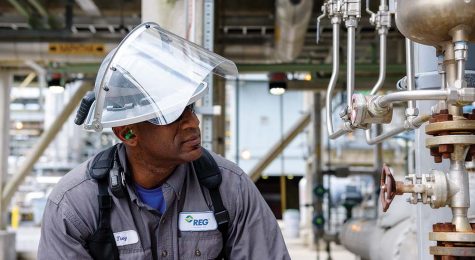Farming in Ames: Rolling Toward the Future
Innovative companies in Ames are creating better ways to yield crops and improve efficiency.
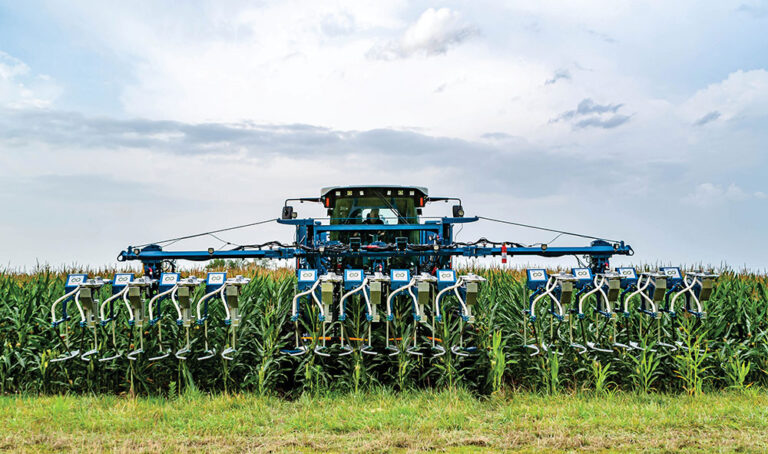
While agriculture is a historical industry in the Ames MSA, it has not stayed stagnant.
Innovative companies are discovering better ways to yield crops and improve efficiency for farmers. Two companies in Ames are demonstrating how they pushed traditional agricultural practices into the future by layering in science and technology and leveraging profitable partnerships in the region.
In This Article
Innovative Farming in Ames
PowerPollen, founded in 2015, offers a breakthrough, scalable technology to collect, preserve and apply pollen on-demand to help improve the productivity, profitability and sustainability of modern agriculture practices.
“The key technique PowerPollen has developed is a cost-effective and scalable process to preserve large quantities of pollen,” says Jason Cope, the company’s co-founder and chief intellectual property officer.
“In natural conditions, corn pollen typically dies in less than an hour. Our patented process allows us to preserve pollen for years without losing viability. The use of preserved pollen for pollination enables us the ability to pollinate when the female plant is optimal for receiving pollen. These well-timed pollinations increase the overall seed yield and seed purity, as well as minimize losses due to poor environmental conditions.”
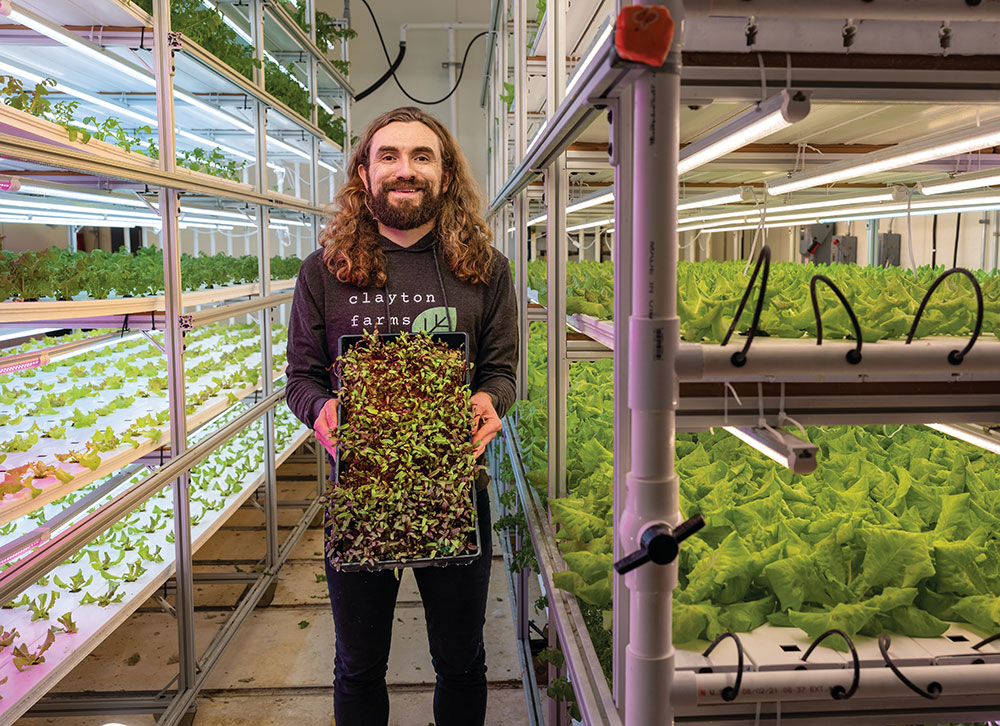
From an idea that started from a love of poker, Clayton Farms is revolutionizing the way people receive produce.
Originally started as “Nebullam” in 2017, founders Danen Pool and Clayton Mooney focused on designing and building indoor farming equipment and software for the vertical farming industry.
When the pandemic hit, the company streamlined operations to focus on farming. Today, Clayton Farms builds direct-to-consumer indoor farms and owns the supply chain – from seeding through delivery on someone’s doorstep.
“Ames has one of the fastest-growing startup communities in the Midwest.”
Clayton Mooney, Clayton Farms
Higher Ed, Higher Yields
PowerPollen leaned on productive partnerships within the area to generate bigger impacts for its customers. Iowa State University pitched in with assistance for data processing, biological research and development, agricultural engineering, and in support of grant applications.
Clayton Farms also took advantage of its proximity to the academic powerhouse.
“Having Iowa State University in the backyard means there are always new people, bringing diverse backgrounds and views when it comes to solving problems,” says Mooney, co-founder and chief farmer. “It’s critical to help these individuals find success when launching their own companies here because that makes them that much more likely to stay and grow right here in Ames.”
Mooney says his company has utilized almost every resource between campus and their offices in the Iowa State University Research Park, the location of their first headquarters and farm. But it’s the subscribers who dictate the future of the company.
“When we enter a new market, we appeal to subscribers that match our other market demographics and utilize similar channels to acquire subscribers,” Mooney says. “Every decision we make is data-driven because subscribers are the judge, jury and executioner of our company.”
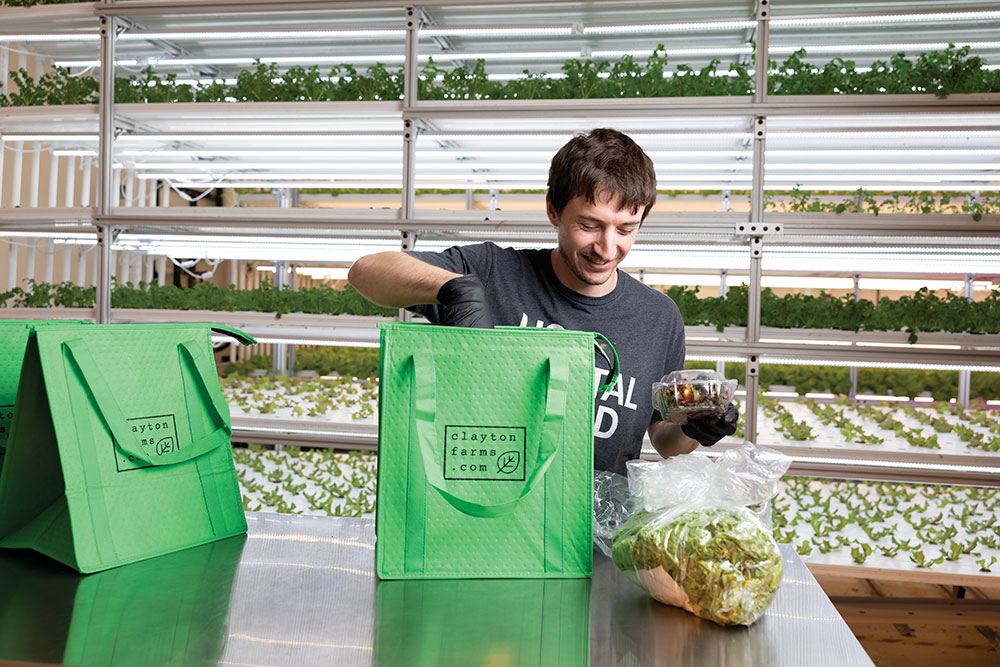
Teamwork Makes the Beans Work
Cope says local economic development programs also contributed to the company’s success, including the Iowa Economic Development Authority, the City of Ankeny, the City of Ames, Ames Seed Capital, the U.S. Department of Agriculture-Small Business Innovation Research program, Iowa Bankers Association, Cultivation Corridor, Greater Des Moines Partnership and others.
“We see these partnerships continuing to increase as we broaden the scope of our technology from corn to additional row-based crop systems,” Cope says.
In conjunction with PowerPollen’s preservation technology, it has also developed large-scale, mechanized systems for pollen collection and application. The mechanization enables hundreds of acres to be pollinated in a single day.
“As we progress with our innovations, we have expanded our expertise to the preservation of pollen from other key crops, including wheat, rice, vegetable seed and ornamental seeds,” Cope says. “We expect to commercialize similar large-scale pollination systems in these key crops in future years.”
Mooney says one competitive advantage Clayton Farms has is its location. “Ames has one of the fastest-growing startup communities in the Midwest,” he says. “It’s because our founders are helping lead their startup community.”
Amazing Uses for Corn
The first North American industrial-scale facility of its type to use agriculture residue as its feedstock is located in Nevada, Iowa.
Verbio Nevada is a biorefinery that grinds up stover and processes it to make renewable natural gas that goes into an Alliant Energy pipeline for eventual sale to customers. Stover is corn residue such as cobs, husks and leaves that lay on farmland ground.
Uses for renewable natural gas can include electricity generation, thermal functions like heating and cooking, bioplastics and vehicle fuel.
“We learned a lot in 2022 that will make us even better in 2023 and beyond,” says Greg Faith, president of Verbio Nevada. “We harvested 26,000 acres of stover in 2022, and we appreciate the farmers who work with us to make this successful.”
Verbio Nevada buys bales of stover from area farmers within 30 to 50 miles of the plant. The facility will spend about $1 million for stover in 2023. Verbio also plans to begin producing ethanol at the plant by the third quarter of 2023, and the company will also start making fertilizer.
“The opening of our ethanol plant in 2023 will allow us to triple our natural gas production, making renewable natural gas as well as corn-based ethanol,” Faith says.
Almost all U.S. gas is blended with at least 10% ethanol, and Iowa is the nation’s leading producer of ethanol and the corn used to make it. The Verbio Nevada biorefinery, which was built at a cost of $115 million, also hopes to eventually use carbon dioxide (a byproduct of the plant’s production) to make synthetic natural gas and chemicals.
“We’ve come a long way since we first opened,” Faith says. “We will soon have a workforce topping 100 people.”
– Staff Writer Kevin Litwin contributed to this article.
Get to Know the Ames MSA
Want to learn more about living and working in Ames, Iowa? Check out the latest edition of Livability Ames, Iowa And the Greater Boone & Story County Region.

